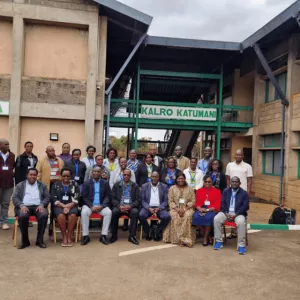Strengthening Capacity of Extension Officers in Gender-responsive Bean Research, Digital Extension and Agribusiness, in Laikipia and Nyeri Counties, Kenya
The training was attended by 16 officers (5 men and 11 women). This was done because a strong and responsive extension system is critical for effective and equitable last-mile delivery of agricultural services, technologies and innovations for increased agricultural production. Although seed is an integral part of the agri-food system, it is often unavailable and unaffordable to smallholder farmers in

Strengthening Capacity of Extension Officers in Gender-responsive Bean Research, Digital Extension and Agribusiness, in Laikipia and Nyeri Counties, Kenya
The training was attended by 16 officers (5 men and 11 women). This was done because a strong and responsive extension system is critical for effective and equitable last-mile delivery of agricultural services, technologies and innovations for increased agricultural production.
Although seed is an integral part of the agri-food system, it is often unavailable and unaffordable to smallholder farmers in rural areas, especially women and vulnerable groups. In addition, the poor extension system of getting seeds and information to farmers remains a drawback to adoption and increased productivity. Further, increased climate variability exposes these vulnerable groups to risks like pests and diseases. This calls for more concerted and focused strategies by researchers and development actors to mitigate these challenges through robust partnerships and training.
While addressing the team, Dr. Patrick Ketiem, the Institute Director, Agricultural Mechanization Research Institute, Katumani, noted that a strong and responsive extension system is critical for an effective and equitable last mile delivery of agricultural services, technologies and innovations for increased agricultural production. He noted that counties remain the major
drivers of agricultural transformations. However, due to the sector’s declining human resources and low funding, the desired extension services remain weak and largely inaccessible to most farmers. This has led to decreased agricultural production and increased food and nutrition insecurity risk. Therefore, there is a need to strengthen the capacity of the extension staff and other last-mile agricultural service providers to address the emerging agricultural challenges.
Hon. Wilson Maringa, Chief Officer of Agriculture, Livestock and Aquaculture, Nyeri County, noted that the Kenya Kwanza Government’s Agriculture Strategy objective is increasing food production. He noted that the County has reserved a budget for resilient crops, of which beans are one of them. Beans were selected for their nutritional value – protein, carbohydrates, vitamins, and micronutrients, mainly iron and zinc.

